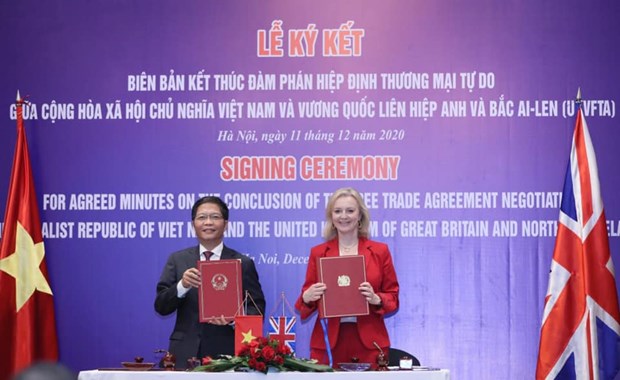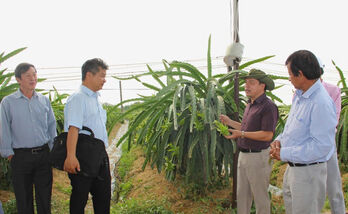
Minister of Industry and Trade Tran Tuan Anh and UK Secretary of State for International Trade Liz Truss sign the agreed minutes on the conclusion of negotiations over the UK-Vietnam Free Trade Agreement on December 11. (Photo: VNA)
Based on the terms of the EU-Vietnam Free Trade Agreement (EVFTA), the UKVTFA is a new-generation, high-quality bilateral agreement that reduces tariffs to zero and eliminates non-tariff barriers on most goods from both countries under a short roadmap, An said. It also contains important provisions on intellectual property rights, investment liberalisation, and sustainable development, and commitments to meet the standards of the International Labour Organisation (ILO) and the UN Framework Convention on Climate Change.
The trade pact is significant because it ensures there will be no interruption to Vietnam-UK bilateral trade because of Brexit, the ambassador said, adding that the deal will enter into force on January 1, 2021, right after the UK’s post-Brexit transition expires on December 31.
This would facilitate the continued trade of goods between the two sides under the EVFTA, according to An.
He added that the UKVFTA will help boost the volume of goods from both sides entering the other’s market and will enhance economic cohesion between the two strategic partners. The deal will also pave the way for a new wave of foreign direct and indirect investment from the UK in Vietnam in the former’s areas of strength, such as renewable energy and environmental technology.
He cited a proposal from a major British corporation to invest tens of billions of USD in wind power production, turbine manufacturing, and electricity transmission in Vietnam as an example. The UK can offer the most in the fields of pharmaceuticals, machinery, equipment, chemicals, automobiles, and banking and insurance, he said.
Meanwhile, a number of large Vietnamese firms are enthusiastic about seeking investment opportunities in the UK, the diplomat continued. As soon as the trade deal takes effect, Vietnamese rice will enjoy a zero percent import tariff compared to 17.5 percent now. A number of Vietnamese fisheries products, such as prawns and fish, will also benefit from lower customs duties.
Vice Chairman of the Vietnam-UK Network, Paul Smith, said the UKVFTA will make more UK firms consider Vietnam as a new destination. With more than 20 years of experience in the country, he finds doing business here quite easy.
The Vietnamese Government is very down to earth and open to foreign investment, he said, adding that it has also taken major steps forward in adopting rules in trade, copyright issues, and intellectual property protection.
He expressed his belief that the number of British businesses present in Vietnam will increase considerably in the future.
Trade Counsellor of Vietnam to the UK Nguyen Canh Cuong said the agreement will ensure the non-interruption of trade between the two countries and maintain the recovery of Vietnam’s exports to the UK. He named garments, sportswear, furniture, computers, mobile phones, tea, coffee, pepper, prawns, specialty rice, tropical fruit, and construction steel as among Vietnamese products likely to be competitive in the UK.
In the service sector, Vietnam also holds a competitive edge in air freight and software design services, he added. As the UK’s demand for such products is large, the trade deal will help Vietnamese enterprises expand their market share in the country, he said.
Minister of Industry and Trade Tran Tuan Anh and UK Secretary of State for International Trade Liz Truss signed the agreed minutes on the conclusion of negotiations over the UKVFTA on December 11. Ninety-nine percent of tariffs on goods traded between Vietnam and the UK will be cut at the end of the tariff elimination roadmap, meaning Vietnam will save about 114 million pounds on exports to the UK, while the figure for the UK will be 36 million pounds.
Two-way trade has developed steadily since the two countries established a strategic partnership in 2010. Over the last three years, Vietnam has exported around 6 billion USD worth of goods annually to the UK, accounting for less than 1 percent of the country’s total imports of nearly 700 billion USD. Meanwhile, Vietnam’s imports from the UK have stood at about 1 billion USD each year.
Vietnam’s shipments to the UK amounted to some 4.1 billion USD in the first 10 months of this year, down 14 percent against a year earlier. Exports have shown signs of recovery since August, however, thanks to the positive effects of the EVFTA, with October’s figure up 1.3 percent month-on-month to more than 477 million USD./.
VNA
 Collective economy—a sustainable direction to escape poverty
Collective economy—a sustainable direction to escape poverty



